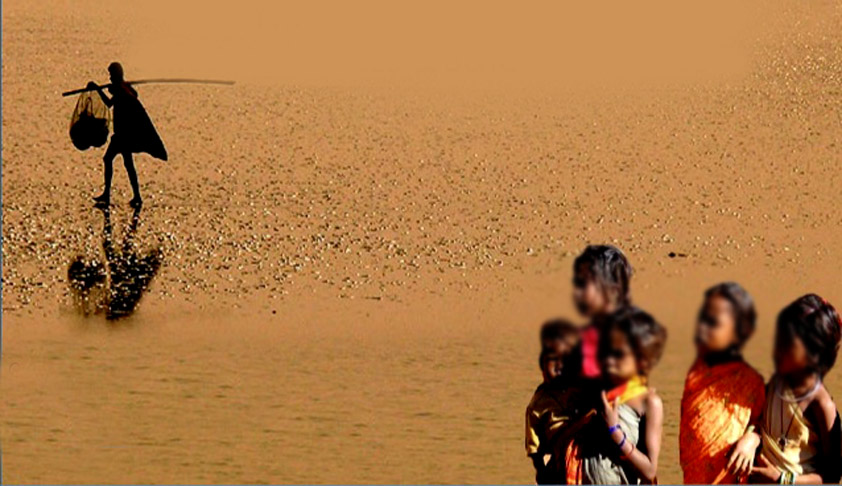Alienation Of Tribal Land Is Not Just A Legal But Cultural Issue
Dr. Topi Basar
3 Dec 2016 12:56 PM IST

The recent judgment of Supreme Court in UCO Bank vs. Dipak Debbarma in which Section 187 of the Tripura Land Revenue and Land Reforms Act, 1960 was held invalid as it was said to be inconsistent with the Securitization and Reconstruction of Financial Assets and Enforcement of Security Interest Act, 2002 (a Central Act). Section 187 of the Tripura Act prohibited the bank fromtransferring the land mortgaged by an ST member to a non-ST person as invalid. Despite the Tripura Act being placed in ninth schedule it could not enjoy the legal immunity provided under Art. 31-B of the Constitution. The Central Act is held to prevail over the State Act by invoking the principle of predominance of dominant legislation or Central legislation in the event of inconsistency of law made by the Union Parliament and the State. It was held that bank can sell the mortgaged land to any person to recover its loan amount as per the SRFAESIA.
However, the judgment raises some important questions premised on Sixth Schedule and Article 371 of the Constitution. Considering the fact that tribal areas of Tripura, Assam, Meghalaya and Mizoram falling under sixth schedule having Autonomous District Councils namely, North Cachar Hills ,Karbi Anglong, Khasi Hills, Jaintia hills, Garo hills, Tripura tribal areas district, Chakma district, Mara district, Lai district. They have been conferred power under paragraph 3 of the sixth schedule to make laws with respect to the allotment, occupation or use, or the setting apart, of land, etc for any purpose likely to promote the interests of the inhabitants of any village or town.The District Councils can make regulation prohibiting non-tribals from carry on wholesale or retail business in any commodity (para 10. 2. d).This in addition to many other powers. The principle stated in the UCO bank ignores this aspect altogether. Also, in the light of Article 371 A, Nagaland has been given a special protection by virtue of which no Act of Parliament in respect of ownership and transfer of land and its resources shall apply to the State unless the Legislative Assembly of Nagaland by a resolution so decides. Most importantly, in Arunachal Pradesh, Mizoram, Sikkim (ILP needed only in border areas) and Nagaland the requirement of inner line permit for all persons including citizens are needed to enter these states.This is continued under the Bengal Eastern Frontier Regulation, 1873 which also states under section 7 that it shall not be lawful for any person, not being a native of the districts to acquire any interest in land or the product of land beyond the said “inner line” without the sanction of the State Government.The Manipur Land Revenue & Land Reform Act, 1960 enacted by the Parliament, Section 158 says, ‘No transfer of land by a person who is a member of Scheduled tribes shall be valid unless the transfer is to another member of Schedule tribes; or where the transfer is to another person who is not a member of any such tribes, it is made with the previous permission in writing of Deputy Commissioner provided that the Deputy Commissioner shall not give such permission unless he has secured the consent thereto of the District Council within whose jurisdiction the land lies; or the transfer is by way of mortgage to a co-operative society.
As per the Meghalaya Transfer of Land (Regulation) Act 1971, no land in Meghalaya shall be transferred by a tribal to a non-tribal or by a non- tribal to another non-tribal except with the previous sanction of the competent authority,Provided that the Government of Meghalaya if satisfied may, from time to time, by notification, prohibit any transfer of land within such area or areas as may be specified in the notification and there upon the competent authority shall not sanction any such transfer of land under the provision of this Act, within such area or areas. In Nagaland also State laws prohibit sell of land to non-tribal or outsiders. The ownership differs from community to community among the Naga tribes. The land is classified as either clan land or village land. Even today some follow their traditional land holding. For purchase of land by any person, he needs to consult with other members of the clan. It is only after the consent granted by the other members of the clan that the land can be purchased. If anyone in the clan wants to sell land for need of money in time of emergency, he should make known his problem to the other members of the clan. The members of the clan will try to solve the problem by themselves without the involvement of any outsider. The land is either purchased by an individual or a group of members in the clan. Mizoram too enjoys special Constitutional protection like Nagaland under the Art.371 H. In Mizoram, ownership of land prior to the British was vested with the chief of the village who distributed jhum land to individual families and got a part of the crop as rent (called fathong) in kind. The Mizo District Agricultural Lands Act, 1963, now governs the land system in Mizoram. All lands belong to the government. People enjoy only those rights, which are recognized by the government, land title is called patta.No land in Mizoram can be sold, mortgaged, leased, gifted or otherwise transferred by a tribal to a non-tribal without the permission of the administrator.
Article 371 F enshrines special provisions with respect to the State of Sikkim by which all property and assets whether within or outside the territories comprised in the State of Sikkim were vested in the Government of Sikkim. Neither the Supreme Court nor any other court shall have jurisdiction in respect of any dispute or other matter arising out of any treaty, agreement, engagement or other similar instrument relating to Sikkim. Old laws like Sikkim Revenue Order No.1 protects lands of Sikkimese Bhutia and Lepcha from being sold to members of any other community.
The honorable court in UCO bank case focused primarily on the Central Act (SRFAESIA) treating banking as the core subject matter falling under the Union list and the Tripura Act said to encroach upon this power, hence must pave way for the former.It would not be wrong to say that the principle or ratio emanating from the judgment will lead to serious constitutional complexities in these States. Land is integral to cultural ethos of the tribals and each tribe has its own customary laws or community or clan rules governing landeven prior to colonial rule. Unique cultural history and ethnicity is deeply rooted to land and strong sense of cultural affinity to land and forest. Land is sacred to the tribes, it is not just a myth but a matter of tribal identity and culture, by protecting land and forest it is believed that tribal identity is preserved. It is true that customary laws on land have been weakened considerably with the advent of modern developments and its pressure on the State, yet so long as the Constitutional guarantee of ethnic freedom and autonomy is intact in the form of sixth schedule and other laws, the apex Constitutional court of the country ought to take these aspects in account. Already there is a wide disjunction between the legal and social realities as the land laws recognize only individual ownership and treat land without pattas as State property eroding community-centred customary law. A situation wherein the land gets alienated by the State without the consent of the community for various purposes. Most conflicts are around land and its alienation in these region. Without proper patta or land title most public banks would not offer loans also as North East is still primarily governed by customary laws on land rights even today and land record system is not yet systematized. For the tribal in general alienation of land to outsideris regarded as the biggest threat to its social existence apart from being a direct onslaught on their indigenous tribal identity proudly held. The judiciary (mainly) and the government have great responsibility to play a balanced role in ensuring their due status and human dignity accorded under the Constitution of India.Apparently implication on sixth schedule and Art. 371 were neither argued nor discussed by the Respondent’s counsel before the Supreme Court, however these factors seem to have influenced or taken into account by the High Court which had upheld the Tripura Act. It is hoped that the honorable Supreme Court would always perform its custodial duty to protect the interest of the tribal constitutional right over land and forest. General fear being soon the banks will start using this precedent upon the tribal people.
Dr. Topi Basar,is an Associate Professor ,National Law University and Judicial Academy, Assam
Law University and Judicial Academy, Assam[The opinions expressed in this article are the personal opinions of the author. The facts and opinions appearing in the article do not reflect the views of LiveLaw and LiveLaw does not assume any responsibility or liability for the same]
This article has been made possible because of financial support from Independent and Public-Spirited Media Foundation.


